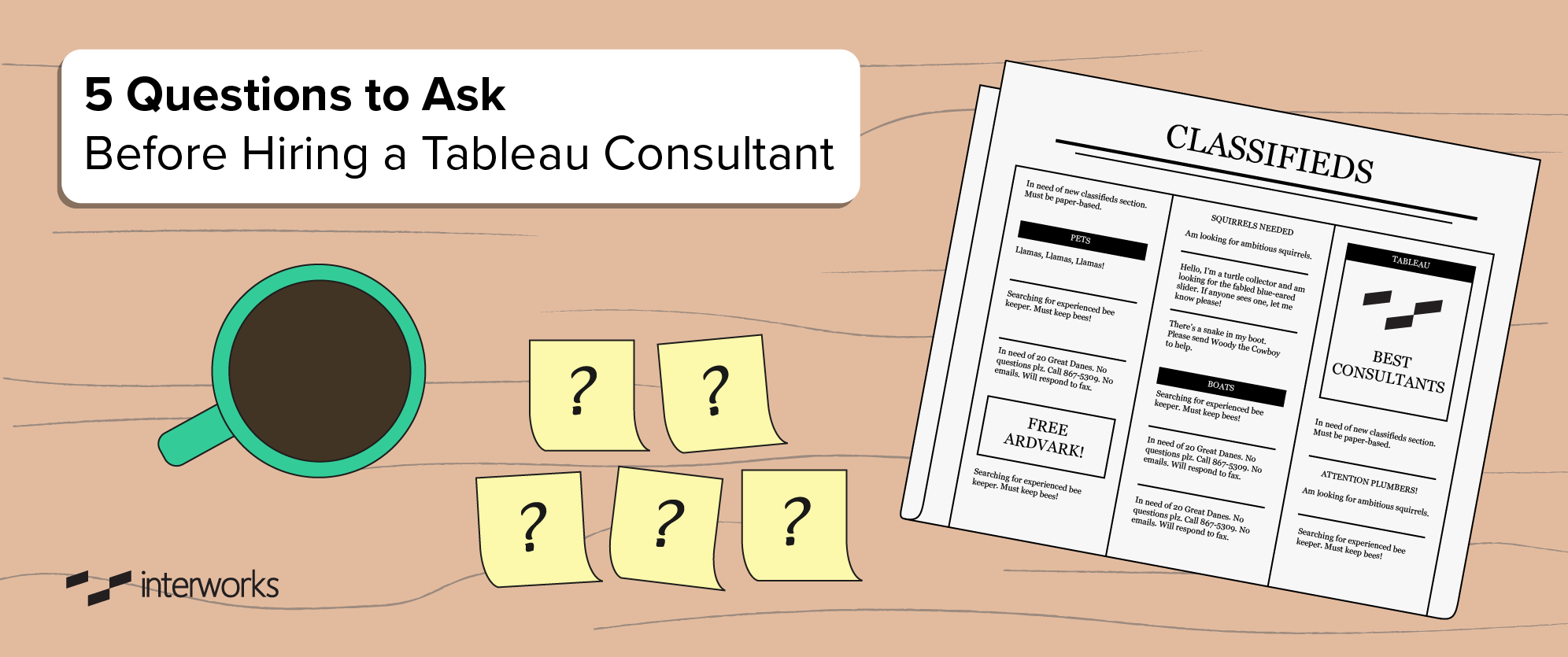
Remember Jeff Foxworthy? He did the whole “you might be a redneck” shtick. As a business using Tableau or working with data on any level, there are times when you might need a Tableau consultant.
If you’re looking to grow your analytics culture into a full blown enterprise-level deployment, you might need a Tableau consultant. If you’re looking to work with a complex data source to produce robust dashboard templates, you might need a Tableau consultant. If you’re looking to clean up several disparate and large data sources for use with your analytics team, you might need a Tableau consultant.
When the time comes to bring in outside help to accomplish some big goals, it’s important that you ask these essential questions so that you choose the right Tableau consultant for your needs and your project has the best opportunity for success.
Question #1: What Do I Need?
Before bringing in a Tableau consultant, the most important thing is to honestly and accurately assess your needs. Try not to think short term but rather longer term goals. You can even leverage your potential consultant to assist you with your discovery and requirements gathering. A lot of companies will first release a Request for Information prior to an RFP just to get as much information on the ideal solutions for their problems.
Also, everyone knows that the more you buy from a vendor, the better price you can get. Putting more money into someone’s pocket gives you more leverage to negotiate. You’ll get a better price for each item or service individually by grouping them. This is true in the consulting world, as well. Consultants like guaranteed work for a couple of reasons.
So, if you’re interested in having some dashboards created, why not consider adding more services that you can benefit from in the same project, like a few Tableau training courses or some data preparation.
Question #2: Are We Ready to Succeed?
Not enough clients ask this fundamental question: “What happens if we are successful?” Some of the greatest business experts and management consultants tackle this exact question in voluminous books and white papers. If the project is a raging success, are we prepared? For instance, let’s assume that your goal is to create an enterprise-level deployment with multiple environments for production, testing, training and development.
The questions that you might ask in preparation of this goal include:
- Are our data sources scrubbed and ready to use?
- How many end users access our reports?
- Do we have enough Tableau Desktop report creators?
- Do we have well developed rules on permissions, access and security?
- How much do we anticipate usage growth on our network or Tableau server in the next 12 months?
- Is your executive leadership ready to fully leverage the Tableau opportunity or are they still considering it an experiment?
There’s nothing more deflating than smashing a project beyond all expectations only to have the wheels grind to a halt because the organization was not prepared for success.
Question #3: How to Pick a Consultant?
Evaluating a consultant is a big task regardless of how big or small your project. Not all Tableau consultants are created equal, and some are very good at specific things and not good at others. Navigating the market place can be a tricky task. The best way to get started is to approach your Tableau representative or make a contact with a Tableau person through a trade show or convention.
Tableau consultants are well known to the Tableau sales reps in particular. They hear all about their work, their projects and their proficiencies, which is the basis for a reputation. Talk to Tableau about what you need and they will steer you into the right direction.
Do your due diligence on every potential consultant, starting with their clients, their stability, areas of expertise and any industry awards or recognition. That will get you into conversations with quality Tableau consultants with whom you can star the RFP process.
Question #4: How Do We Get Started?
When you have selected your Tableau consultant, the next thing to do is to bring both teams together to discuss the project and the particulars of your organization. The most important ingredient to success for a consultant is knowledge. The more you can give them on your expectations the better.
Essential considerations include:
- Requirements of the project
- Local landscape of who does what and who has approval/veto authority
- Technical aspects and infrastructure
- Previous projects and analytics history
- Organizational-side team members and their roles
On the reverse, you should understand exactly what your Tableau consultant plans on delivering for their solution. Get to know each of the consultant’s team members, their roles and their contact information.
Finally, establish an escalation chain just in case there is a problem or a breakdown in process or communication.
Question #5: What Happens Next?
The great chess masters are able to see multiple moves ahead. As much as you can, try to do the same with your Tableau consulting project. What is the next step after you’ve completed this goal? The more you can plan for the future and forecast potential needs, the better you can steer your organizational and your analytics team now to reach those long-term goals.
Speak frankly with your Tableau consultant on their opinion on what should be next. Our BI team has worked with massive deployments with thousands of dashboards. We have a clear idea of the growth curse of an analytics culture and where your organization might benefit the most.
Tableau Consulting Services
If you are looking for a Tableau consultant, then InterWorks can help. We have a very long list of awards, distinctions and globally renowned clientele that speaks volumes on our experience and our capabilities. Contact us today for more information on how we can help your organization achieve your analytical goals.

